Efficiency and productivity should be top priorities in any doctor’s office.
But, like in all jobs, it’s not always easy to stay productive and give your maximum effort.
It becomes especially hard to care for the patient while dealing with those mundane administrative tasks.
However, small changes can improve your daily operations.
In this blog post, I will share key strategies and solutions that will save you time, money, and energy.

Optimize Your Workspace
Feeling stressed and overwhelmed?
One of the main reasons may be your workspace.
According to research by the International Data Corporation, untidy workspaces lead to a loss of productivity, costing businesses $2.5 million annually!
You need to create a more efficient and organized environment so as not to lose unnecessary money.
Start small by cleaning up your desk. Add some filing systems along with organizational tools such as shelves or a label maker.

By minimizing distractions, you can expect an increase in productivity rates along with a better atmosphere when working.
You will not only get a pleasant environment for your workday but also improve the overall experience for your patients.
Delegate Tasks
As someone who has faced burnout, I understand how easy it is to overwork yourself.
It can be challenging, but try giving some of your tasks away.
This doesn’t mean you should rely on others entirely, but some things can be handed off.
One area that comes to mind is data entry.
This isn’t brain surgery and can easily be done by anyone in the office. If there’s an assistant or nurse, let them collect patient info when setting up appointments. You’ll free up your time for more direct patient care.
Professor Xiyang Zhang and a group of experts conducted a study that looked at how delegation, where managers give tasks to employees, affects whether employees seek feedback.
They discovered that when managers delegate, two important things happen:
- Employees feel more motivated and active in their work, which is called psychological empowerment.
- Employees ask for feedback from their supervisors more often.
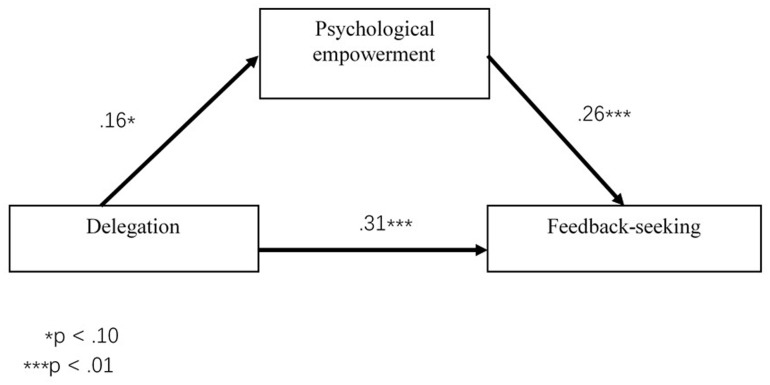
Simply put, when managers delegate tasks, it makes employees feel more motivated and likely to seek feedback.
And managers, or in our case, physicians, will have time for more important things. It’s a win-win.
Prioritize Communication
Nurture effective and open communication. Always.
Your first step to this would be to have regular meetings with your team.
In these meetings, present guidelines and goals that everyone should understand and follow.
But most importantly, let everyone share their opinion and feel valued.
The Economist Intelligence Unit’s research reveals how poor workplace communication can harm a company’s performance, causing:
- Sales to drop by 18%.
- Employee stress levels to go up by 52%.
- Employee morale to decrease by 31%.
- Project failure rates to increase by 44%.
- Performance goals to be missed by 25%.

Pro tip: Use async communication tools to get in touch quickly with your team and to inform them about news, eventual changes, new schedules, etc.
For instance, if someone wants to exchange shifts or an unexpected situation occurs, this is a faster and simpler way to address it within the team.
You will all be able to communicate and find the best solution for everyone to ensure the workday goes smoothly.
Automate or Outsource Billing
If you want to make your billing work easier, try using automation.
Billing software can help save your staff time and prevent mistakes, ensuring patients pay on time.

If handling billing feels overwhelming, think about outsourcing. Experts in billing services can do the work for you, keeping your business organized and running smoothly.
According to Dr. Catalyist, outsourcing medical billing is easy and comes with several advantages:
- Outsourcing frees up time to focus on patient care, especially for smaller practices.
- It saves money on infrastructure and ensures timely billing, increasing revenue.
- Outsourcing experts keep up with changing rules and submit accurate claims, reducing errors.
- Outsourcing prevents disruptions due to staff changes or absences.
- Friendly billing staff improve patient satisfaction.
And when should you outsource?
If you’re struggling with billing and credentialing, need improved financial reporting, can’t find skilled billers, are falling behind on reimbursement and compliance, or are facing frequent claim denials due to errors in your healthcare practice. Outsourcing can help streamline operations and boost efficiency.
Schedule Strategically
Efficiency is key in the workday of a doctor, especially when it comes to making the day go by fast.
It starts with the way you schedule your patient appointments.
If you strategically plan to have longer or more complicated appointments during quieter times, you will avoid burnout that can come with a jam-packed schedule.
Booking longer appointments in advance also gives you more time to explore the right solutions for your patients’ conditions, which might lead to better outcomes.
Government Marketing & Procurement found that a well-structured schedule makes sure doctors can provide quality care, reduces administrative burden, and cuts down on patient wait times.
QGenda‘s scheduling platform can help with this.
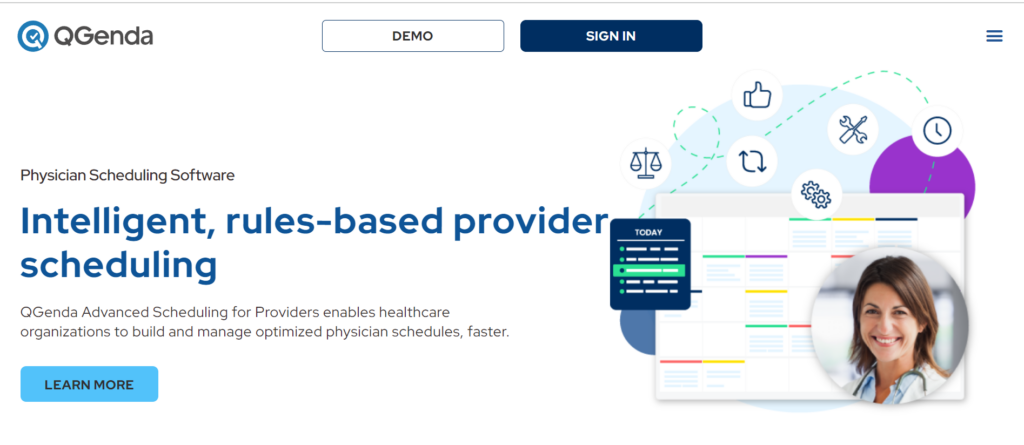
QGenda is a scheduling platform that prioritizes communication, simplicity, and collaboration. In other words, it improves the way doctors manage their time and productivity.
Leverage Telemedicine
Telemedicine can make the day in the office way easier.
You can use it for follow-ups or consultations that don’t require physical examination. Also, telemedicine is highly beneficial for patients in remote areas.
A few more benefits include reduced overhead costs related to facilities, saved time, and most importantly – patient satisfaction.
One simple (video) call and you’ll easily connect with your patient no matter where they are.
Sure, it can’t replace in-person care entirely, but its potential is significant enough to improve accessibility to medical advice and help patients.

Telemedicine got its big moment, especially during the COVID-19 pandemic.
A study confirms that it holds huge promise, particularly with remote patient monitoring (RPM) systems.
RPM is a form of telehealth where doctors use digital medical devices like scales, blood pressure monitors, pulse oximeters, and blood glucose meters. Thanks to these devices, they can watch over their patients even outside of medical facilities.
Optimize Your Inbox
A messy inbox can ruin your day.
To keep things organized and respond fast to patient questions, optimize your inbox. This ensures you don’t miss important stuff.
To manage your inbox better, do the following:
- Prioritize emails by categorizing and flagging important ones.
- Schedule dedicated email time to reduce distractions.
- Use email filters and rules to automate organization.
- Unsubscribe from non-essential emails to declutter.
- Utilize email templates for common messages.
A good idea is to let your skilled medical assistant handle routine prescription refill requests. This stops everyday tasks from filling up your inbox so that you can concentrate on more important patient care.
Use Reminders & Notes
Doctors and patients both benefit from using reminders and transparent notes.
Physicians can use automated reminders for tasks like follow-up appointments and prescription refills, making their jobs easier.
On the other side, patients also find reminders and notes useful. They help them remember important healthcare tasks such as appointments and taking their prescriptions on time.
A study by Dr. John Mafi, a professor at UCLA’s David Geffen School of Medicine, discovered that a simple reminder from a primary care doctor is important to help patients stay involved and more interested in their healthcare.
Dr. John also mentions the OpenNotes movement that promotes the sharing of medical notes with patients.
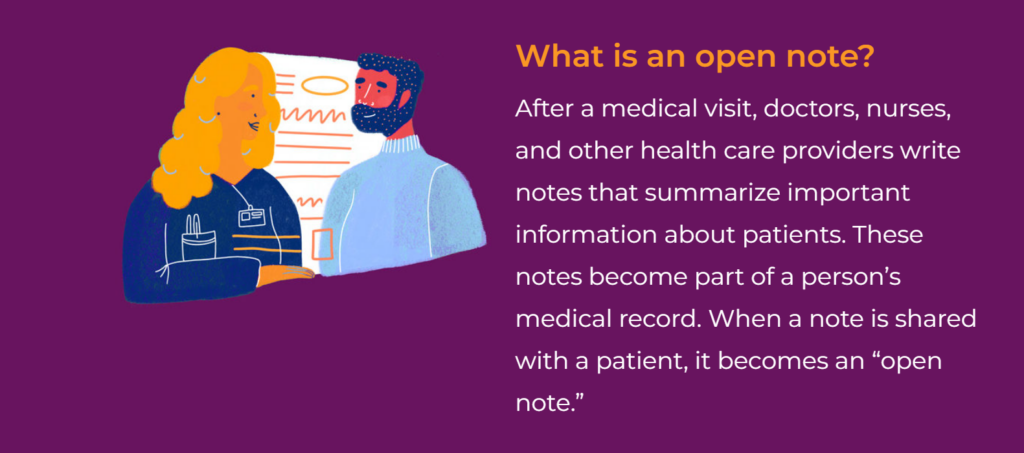
After a medical visit, doctors write notes summarizing important patient information. And when these notes are shared with patients, they become “open notes”.
This positive patient-doctor relationship improves doctors’ work by improving communication, increasing patient compliance, reducing errors, boosting job satisfaction, saving time, improving their reputation, and minimizing legal issues.
And if you need a great appointment reminder service, check out Mend. It uses text messages, emails, and calls to remind patients about their appointments.

The text messages are read by 90% of patients within 3 minutes. With email reminders and easy appointment rescheduling, you can reduce no-show rates to 11-18%, and even more with patient rescheduling, by 2-8%.
Streamline Medical Documentation
Managing clinical records properly is crucial for an enjoyable workday.
It keeps doctors on track and ensures top-notch patient care. You can save time and improve efficiency by using voice dictation or third-party tools for EHR documentation.
One incredibly helpful tool for all doctors is PhraseExpander.
Let’s see how it can make a physician’s office a better place.
Efficiency and Adaptability
PhraseExpander is a tool that helps with the repetitive documents that you have to comb through every day. It gives you the ability to save time and find documents quickly by using abbreviations.
It was made with the medical field’s specific vocabulary and record-keeping needs in mind.
Physicians can add medical terms and phrases quickly without going through a lengthy process.
If a patient has a note that’s specific to them, PhraseExpander enables the quick personalization of each one while still maintaining quality and saving time.
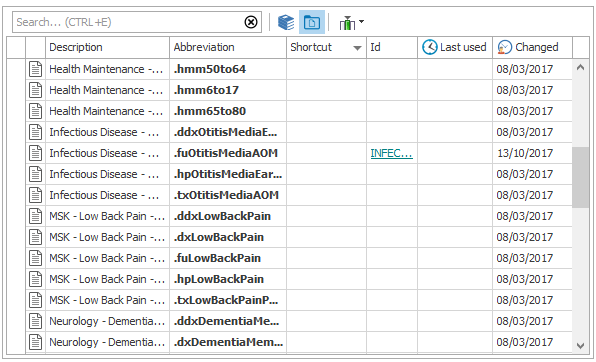
The user-friendly interface simplifies the learning process so you can quickly customize notes for patients.
Accuracy and Spelling
Having a tool like this also helps correct errors in spelling and fills complex medical words.

Two more features you’ll love:
- Automatically fixes double uppercase letters at the beginning of a word (e.g., WElcome -> Welcome).
- Corrects cases where uppercase and lowercase letters are mixed up due to CAPS LOCK being accidentally left on (e.g., wELCOME -> Welcome).
On top of proofreading, it saves you time without needing an extra pair of eyes.
Templates for Time-Saving Documentation
A library with ready-made templates makes it easier to do medical tasks like calculating BMI or doing mental health assessments.
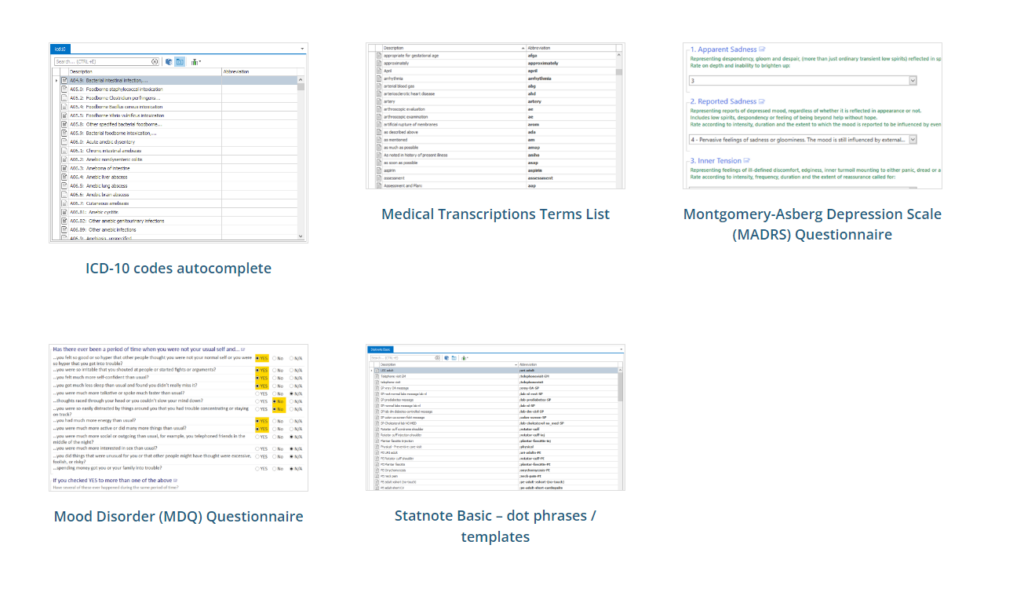
This saves time compared to the traditional way of documenting things.
Doctor Ari Kounavis reported that PhraseExpander not only speeds up his note-taking process but also helps capture more detailed information during history-taking.
Here’s what he says:
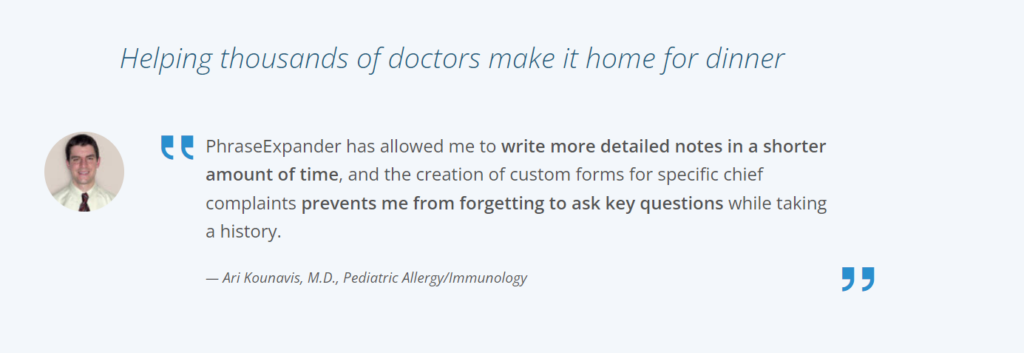
Finally, let me take you through a short list summarizing the PhraseExpander’s benefits:
- Specifically designed for doctors’ needs.
- Import your existing data from Excel and Word.
- Quick and easy template creation.
- Universal autocorrect and autocomplete.
- Effortless template sharing within your team or hospital.
- Compatibility across different EMRs.
- Reduced reliance on transcription services.
- Access to pre-made medical templates.
- Comprehensive support with video tutorials.
- Time-saving dynamic forms and macros.
Get Started with PhraseExpander
Want to learn what PhraseExpander can do for you? Start your free trial
Over to You
Running a doctor’s office takes a lot of work.
But planning and managing things carefully can make it easier. Change some things to give yourself more time to care for patients instead of paperwork.
You will see positive effects like quicker processes and better outcomes in the long term.
I wish you a great day in the office!
